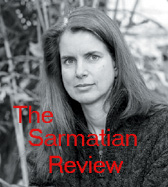| This Issue | Back Issues | Editorial Board | Contact Information |

From the Editor
September 2002
Volume XXII, No. 3
This issue is dedicated to the English-language writers of Polish origin. Our lead review is of the most recent book by Suzanne Strempek Shea in which she plunges into the turbulent waters of cancer survivors' stories. Our reviewer, Professor Bogna Lorence-Kot, wrote about Strempek Shea's Lily of the Valley in the January 2000 issue of SR. We are happy to report that Strempek Shea survived famously her bout with cancer, and we are waiting for further books by her to appear.
In this issue, we also review a book by Anthony Bukoski, the author who combines in his work a sense of solidarity with the Polish community in the United States with an uncanny sense of humor. We laughed through many of his stories, not only those in Polonaise, but also those we read elsewhere, notably in Chronicles (we gave a short review to one such story in the April 2002 issue of SR). Interestingly, it is those Polish American writers who manage to inject a sense of humor into their stories and novels that gain an appreciable recognition by the general American public. Strempek Shea and Bukowski are among those writers.
Also in this issue, Professor John J. Bukowczyk concludes his series of reviews of the Rev. Waclaw Kruszka's History of the Poles in America to 1908. It is to be hoped that this book will find its way to local libraries and that it will be checked out from time to time by those who complain about the scarcity of books on Polish topics in public libraries.
Sarmatian Review has established a Literary Prize of one thousand dollars that will be awarded to an American Polish writer in 2002. The jury will consist of Members of the Board of the Polish Institute of Houston. The Prize will be awarded to a writer recognized for his/her exceptional achievement in finding in local ethnic cultures the universal values that many of us profess. The announcement about the winner will appear in the January 2003 issue of SR.
The third installment of Zofia Ptasnik's Diary elucidates the pattern of Soviet deportations of Poles to the Gulag. One learns from it that in western Ukraine, many people who provided employment to others were deported, even those who hired housekeepers (thus alleviating unemployment in the countryside). To procure the lists of people who had housekeepers must have involved enormous work: one notes that the Soviets attached much weight to eliminating those who were enterprising enough to create jobs. Their determination to destroy Polish presence in Belarus and Ukraine (for it was mostly the Polish educated classes that employed housekeepers in those areas) appears similar to the determination of the Chinese and Cambodian Communist leaders to eliminate all traces of civilization and start from zero, no matter how gigantic the suffering and death caused by such plans and actions. A pragmatic American might conclude that such proceedings would be sure to derail the area's economy and cause suffering to tens of thousands of people. He/she would be right. In the process, three- and five-year old children were separated from parents and allowed to roam the streets to survive (Józio Chubowski). It appears that not only the top party officials who gave orders for deportations but also the entire hierarchy of petty NKVD workers who executed such orders were guilty of criminal conduct.
In that connection, absent a Gulag Museum anywhere in the world, we would like to recommend a virtual museum on the Web. Nikolai Gutman's paintings, displayed by the Jamestown Foundation, are the second best thing to such a museum: http://russia.jamestown.org/getman/gulag_collection.htm.
Professor Jolanta W. Best's article contains a profound observation that often escapes the Holocaust scholars: that in order to survive in Nazi-occupied Europe, one had to love life, even if one was offered mere scraps of it. Tadeusz Borowski lost his desire to live, whereas Ida Fink did not. He could not cope with his memories and committed suicide; she became a published author. There is a lesson here for those who can learn from history.
Back to the September 2002 issue
The Sarmatian Review
sarmatia@rice.edu
Last updated 9/12/02